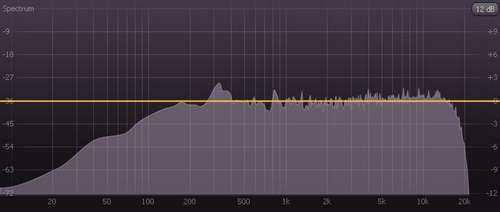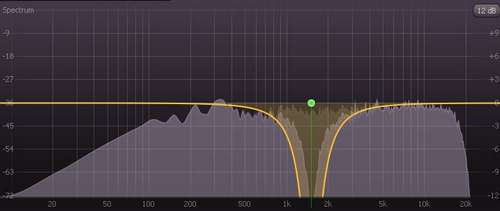Notched Audio Therapy

How our therapy works
Scientists now agree that understanding and thus treatment of tinnitus requires a comprehensive approach in which the ear and the central nervous system must be considered together.
In most cases, tinnitus appears to be a sound mistakenly created by the brain to compensate some hearing loss. More precisely, hearing-sensory cell damage causes neurons involved in hearing to synchronize by compensating mechanism, which will recreate the hearing sensation of the harmed frequency.
Cerebral plasticity is the capacity of the brain’s neural circuits to change, in one direction or another. In case of damaged brain circuits, this allows us to hope for a restoration, at least partial, to the initial state.
The audio process of lowering or cancelling the volume in a certain frequency band is called “notch”. The sounds thus processed are called “notched sounds”.
Here is a visual representation of a “notched” sound: on the horizontal scale, the frequency from the low frequencies (bass) on the left, to the high frequencies (treble) on the right; on the vertical scale, the intensity or volume.
Top: the initial sound, bottom: the “notched” sound.


“Notched Audio Therapy” is regular listening to audio that has been “notched” on a frequency band centered on the frequency of the tinnitus.
Listening to sounds that are “notched” according to your tinnitus frequency will help reverse your brain’s faulty neural circuits, and as a result, may lower the volume of your tinnitus.
These sound-processing techniques allow significant improvements in more than 70% of cases, and lead to complete disappearance in about 25% of cases.
Notched Audio Therapy.
Here is a summary of a scientific publication detailing how Notched Audio Therapy works, and how it was applied in real-life conditions.
Full article available here.
Maladaptive auditory cortex reorganization may contribute to the generation and maintenance of tinnitus.
Because cortical organization can be modified by behavioral training, we attempted to reduce tinnitus loudness by exposing chronic tinnitus patients to self-chosen, enjoyable music, which was modified (“notched”) to contain no energy in the frequency range surrounding the individual tinnitus frequency.
After 12 months of regular listening, the target patient group (n = 8) showed significantly reduced subjective tinnitus loudness and concomitantly exhibited reduced evoked activity in auditory cortex areas corresponding to the tinnitus frequency compared to patients who had received an analogous placebo notched music treatment (n = 8).
These findings indicate that tinnitus loudness can be significantly diminished by an enjoyable, low-cost, custom-tailored notched audio treatment, potentially via reversing maladaptive auditory cortex organization.
